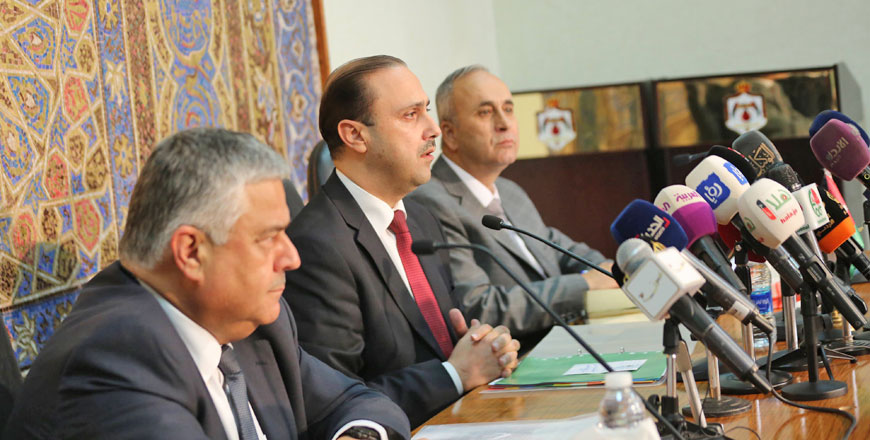AMMAN — The Cabinet on Monday approved the mandating reasons for a draft law amending the Income Tax Law for 2018 and referred it to the Legislation and Opinion Bureau (LOB).
During Monday's session, the Council of Ministers reviewed the law, discussing the expected financial and economic outcomes, and issuing directives to publish the draft on the LOB website:
www.lob.jo for people and specialists to access the draft and give feedback on it.
Prime Minister Hani Mulki directed the economic team of the government and all ministers to maintain a dialogue with all concerned bodies on the law.
Following the session, State Minister for Media Affairs Mohammad Momani and Finance Minister Omar Malhas held a press conference to announce the mandating reasons of the draft law.
During the conference, attended by Income and Sales Tax Department Director General Hussam Abu Ali, Momani stressed that the draft law aims to realise “social justice and equality” and impose deterrent penalties for the crime of tax evasion.
He said that the law is a corrective piece of legislation that will realise tax justice, fight evasion and apply the principle of vertical equity of tax payment.
Momani stressed that the government has ensured that the low-and middle-income tranches will not be affected by widened tax base.
“The critics of the draft law will be the tax evaders, who will save no efforts to rally opposition to it”, the minister said, urging support for the bill.
For his part, Finance Minister Omar Malhas said the draft law re-labels tax evasion from a misdemeanour to a felony with penalties of imprisonment and financial fines.
A department for financial investigations will be established, tasked with taking legal action against tax evaders, Malhas noted, adding that the department will cooperate with the Anti-Money Laundering and Terrorist Financing Unit to detect tax evasion.
Abu Ali said that, according to draft, tax evaders will face one to three years imprisonment if the difference between the due tax and the paid tax amounts to JD5,000 to JD50,000, three to five years if the amount was between JD50, 000 and JD100,000 and five to seven years if the difference exceeds JD100,000.
Under the suggested law, there will be a fine on overdue taxes ranging from 5-25 per cent of the value of delayed tax, depending on the period of delay, thus changing the relevant provisions in the existing law, which stipulates a lump sum fine of JD100 on natural persons and JD200-JD500 on the various types of companies.
The proposed law stipulates that every natural person who reaches the age of 18 has to obtain a tax number, said Abu Ali.
The official explained that the bill exempts individuals whose yearly income does not exceed JD8,000 and JD16,000 for families.
The draft law levies a tax of 5 per cent on the first JD5,000 exceeding that threshold, 10 per cent for the second JD5,000, 15 per cent for the third and 22 per cent for the fourth and 25 per cent for each one dinar above that.
According to the bill, basic materials mining companies will pay 30 per cent of each one dinar of income, 40 per cent for banks, financial companies and legal persons in the financial lease business, 24 per cent for telecommunication, electricity and financial mediation companies, 20 per cent for other legal persons such as trade and services companies and 15-20 per cent for the industrial sector.
In his replies to the press, Momani called for a rational national dialogue over the law.
He said: “A resilient and self-dependent economy is a political strength of the Jordanian state”, stressing that those who do not evade paying taxes should not be concerned about the proposed law.
The minister, who is also the spokesperson of the government, said that under the current law, 95,5 per cent of Jordanians do not pay income tax, while under the amended law, the percentage will drop to 90 per cent.
Malhas said that the tax revenues after the amendment will reach JD300 million yearly, as a result of toughening penalties, amending the percentages and improving the efficiency of tax collection.
